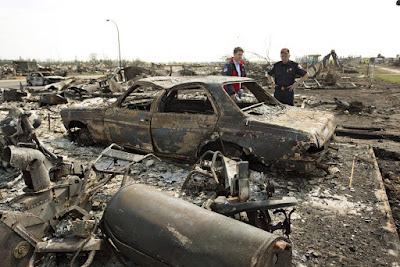An investigation of the theme of Transparency in the Canadian Federal Government. Non-partisan: Power corrupts and Absolute Power corrupts absolutely. Our model: the muckracker journalists.
Tuesday, April 18, 2017
(More) hidden costs of fossil fuel use
Fort McMurray, Alberta, summer 2016, a monster forest fire - nicknamed The Beast - consumed some 500,000 hectares of boreal forest, an area larger than the province of Prince Edward.
"The fire destroyed 2,400 structures, nearly 10 per cent of the city, when it ripped through in May and forced more than 80,000 residents to flee."
http://www.theglobeandmail.com/news/alberta/the-fort-mcmurray-disaster-read-the-latest-weekend/article29930041/
Links to our articles on the Big Fire:
http://transparencycanada.blogspot.ca/2016/05/future-climate-alberta-jumps-gun.html
http://transparencycanada.blogspot.ca/2016/05/alberta-forest-fire-update-monster-is.html
http://transparencycanada.blogspot.ca/2016/05/alberta-forest-fire-update-monster-is.html
A year, nearly, has passed since The Beast passed through Alberta, enough time to begin to register some of its long term effects. Since calamitous fires like the Beast will become more common in a greenhouse gas warmed world, we can begin, if not to measure, at least to appreciate what some of the costs of continued fossil fuel use will be.
externalized cost: Fundamentally, cost externalization occurs when a company transfers some of its moral responsibilities as costs to the community directly or as degradation to the environment. For example, railroads and airlines transfer the cost of fuel, noise, and terminal infrastructure to the community. Airlines and auto manufacturers transfer the cost of degraded air quality to the community and the environment. By externalizing to the community or the environment, many true costs become lost in analysis because the true cost is non-quantifiable and neither the community nor the environment have effective advocates to recoup the damages. A major modern theme in the relationship of business to society is the society's ability (or inability) to resist this kind of externalization. In its extreme, society collapses as business realizes its profits. (Wikipedia: cost externalizing)
In effect, the long term human and environmental costs of present and future Fort McMurray-type fires are the externalized costs of employing fossil fuels to power our industrial lifestyles. The continually rising costs of these "negative externalities" pose vital questions to industrial society:
1- are the benefits of our modern lifestyles worth the cost?
2- are their other ways - renewable energy, for example - to obtain the benefits of modernity while avoiding the rising externalized costs whose impacts we are finally beginning to appreciate?
What then will some of the future costs of continued fossil fuel use be? What can we expect?
For openers, the brave, self-sacrificing men who physically and emotionally over-extended themselves fighting The Beast are (probably) damaged for life:
"The University of Alberta study found one in five of the 355 firefighters surveyed reported persistent respiratory issues including coughing, breathlessness, wheezing and chest tightness. And they're battling more than just physical ailments — mental-health issues affect 1 in 6."
http://www.cbc.ca/news/canada/edmonton/fort-mcmurray-wildfire-firefighter-study-1.4073284
While it is still too early to tell what the long term impacts of the Fort McMurray fire will be, the earlier Slave Lake fire of 2011 may offer some insights:
"Coutts said the Slave Lake fire hit his department hard — half the firefighters quit within the subsequent two years, and many reported ongoing respiratory issues."
Imagine! Fifty percent felt obliged to quit their profession because of psychological and / or physical aftereffects. These are the kind of human - and social - costs we should expect on our greenhouse gas warmed future earth. Think of all the money invested in training those fire fighters and all their experience lost. Then there are long term public health costs, to be borne primarily by the taxpayer (not the fossil fuel corporations or their "officers"). Consider also the human costs of post-traumatic stress disorder and broken health: self-medication, drug and alcohol abuse, broken families.. A vast out-rippling of hidden costs and suffering resulting from our collective addiction to fossil fuels. Are the benefits really worth the costs? (Especially as these costs will escalate dramatically in the coming decades..)
'At the end of the day, you're basically trading a piece of your life away to help people.'
http://www.cbc.ca/news/canada/edmonton/fort-mcmurray-wildfire-firefighter-study-1.4073284
At least researchers on post-traumatic stress disorder are making some money from the fire (but the taxpayers still foot the bill..)
http://www.cbc.ca/news/canada/edmonton/one-million-dollars-ptsd-fort-mcmurray-wildfire-1.4073187
"I'm not a professor, I'm just someone learning to deal with mental illness" - climate changed induced mental illness.. (see video link in above article)
Subscribe to:
Post Comments (Atom)



No comments:
Post a Comment